Electrolytes and Ketogenic Dieting: Your Complete Guide
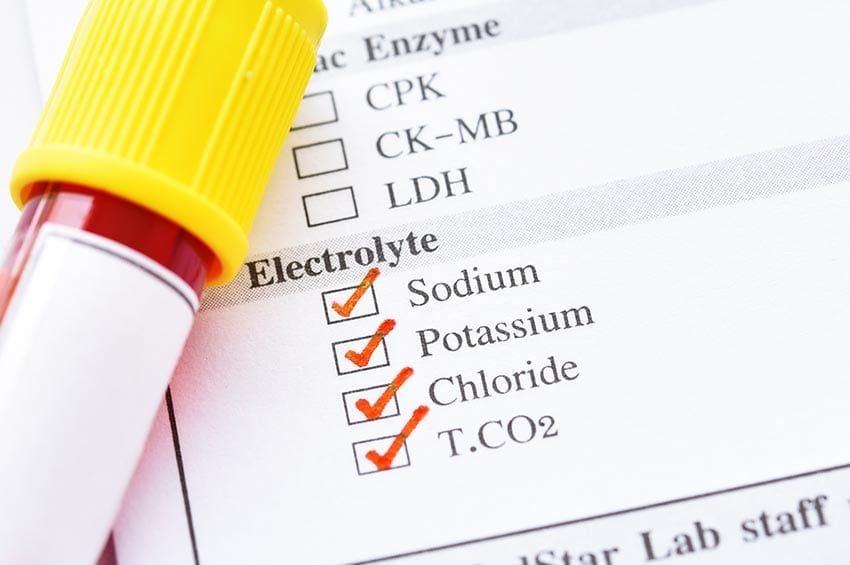
Electrolytes and Ketogenic Dieting – Key Takeaways:
- Proper micronutrient intake is just as important as a well-formulated macronutrient intake.
- Electrolytes become depleted on a ketogenic diet due to increased water excretion and decreased water retention.
- Important electrolytes to focus on during a ketogenic diet are sodium, potassium, and magnesium.
- Increasing your water intake is important on a ketogenic diet to maintain hydration.
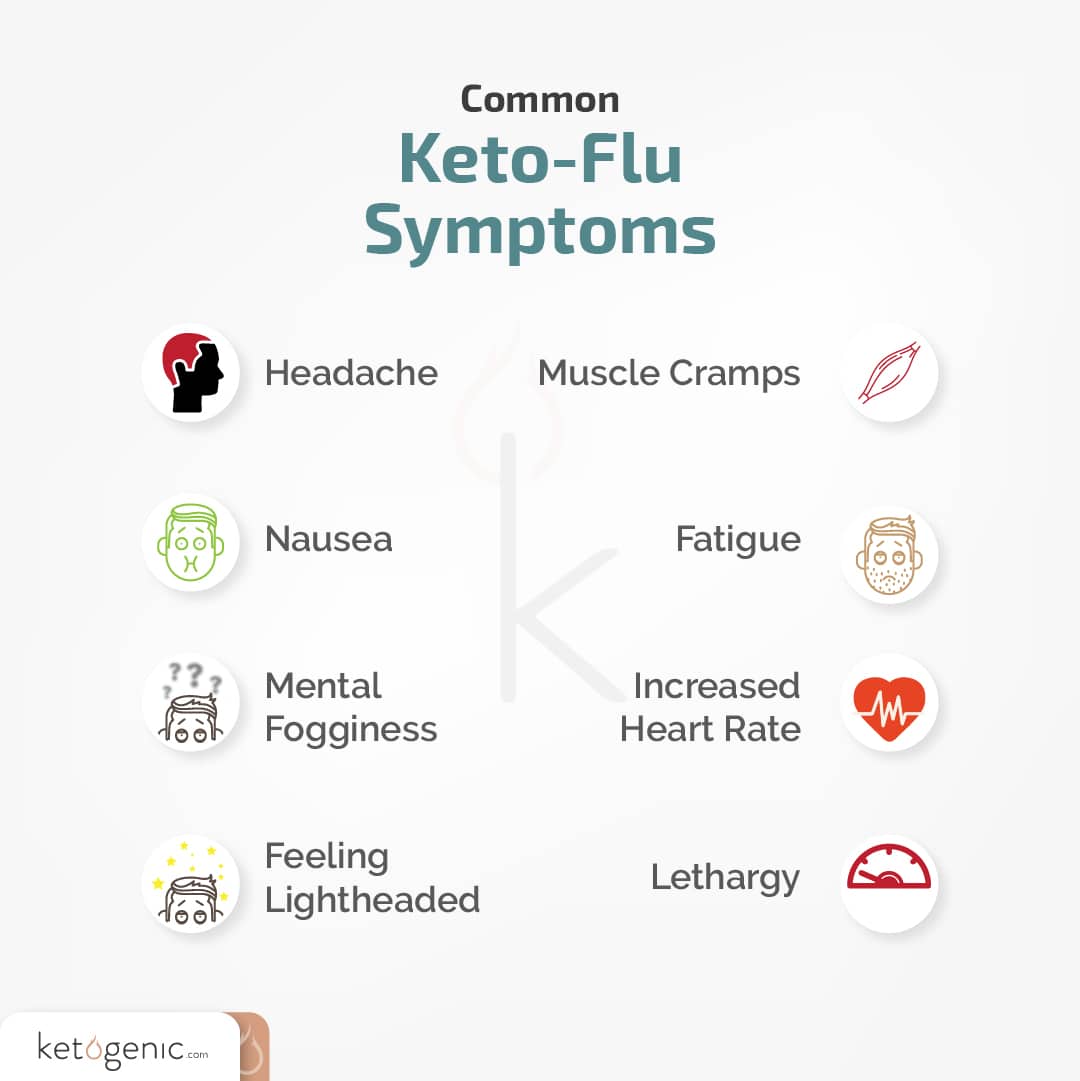 Many people who start a ketogenic diet often experience the unpleasant “keto flu,” which is the name for one or a combination of these symptoms. Even if you are following a well-formulated ketogenic diet with a low amount of carbohydrates, a moderate amount of protein, and higher amount of fat as suggested, it is likely that you may still experience some of these symptoms. While your macronutrients may be in line, there is another important factor to consider: electrolytes and ketogenic dieting. To ensure you keep your body properly nourished and functioning well, a key factor is the balance of electrolytes in the body.
Many people who start a ketogenic diet often experience the unpleasant “keto flu,” which is the name for one or a combination of these symptoms. Even if you are following a well-formulated ketogenic diet with a low amount of carbohydrates, a moderate amount of protein, and higher amount of fat as suggested, it is likely that you may still experience some of these symptoms. While your macronutrients may be in line, there is another important factor to consider: electrolytes and ketogenic dieting. To ensure you keep your body properly nourished and functioning well, a key factor is the balance of electrolytes in the body.
What are Electrolytes?
Electrolytes are minerals found in the body and are the electrical signaling molecules used for maintaining functions within the body, such as regulating your heartbeat and allowing muscles to contract for functional movement. The most relevant electrolytes in this context are sodium, potassium, magnesium, chloride, and calcium.
Why is Monitoring Your Electrolytes Important?
When you shift to a ketogenic diet, your body tends to release more water as opposed to storing it. The reason being that there is less insulin produced as a result of the composition of the diet. This leads to hormonal signals via the renin–angiotensin–aldosterone system signaling your kidneys to excrete MORE water and retain LESS.
Along with increased excretion of water, the minerals found in that water are lost at a higher rate. [1] [2] In the end, you can quickly become depleted of key electrolytes that your body needs to function properly. As a result, you can experience some of the negative symptoms associated with a lack of electrolytes and ketogenic dieting such as the “keto flu.”
Getting the Right Amount of Electrolytes and Ketogenic Dieting
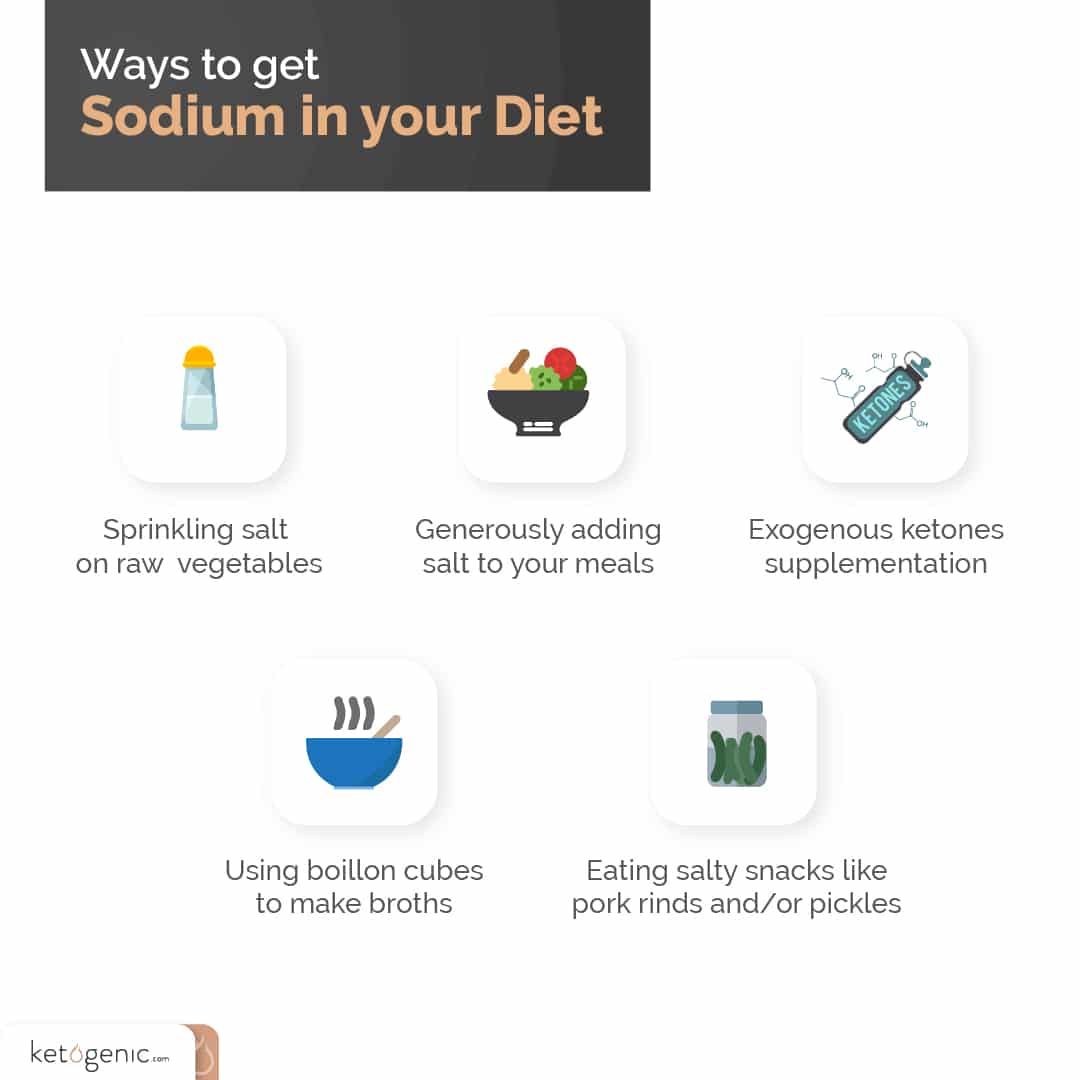 Sodium
Sodium
More than likely, you have probably heard that you should avoid adding sodium to your diet. For most of the population, especially those who are metabolically unhealthy, high sodium intake typically comes along with a high-calorie, high-carbohydrate diet, which over the long term, has resulted in increasing rates of obesity and hypertension. [3] [4] However, for individuals on a low-carbohydrate diet or athletes who are training hard, the truth is that your body needs extra sodium.
Potassium
Potassium is another electrolyte of concern when it comes to electrolytes and ketogenic dieting. Just as with sodium, potassium is excreted at a greater rate with a low carbohydrate intake. When you say the word potassium, most people would probably first think of bananas and potatoes. Not exactly keto-friendly, right? Luckily, there are ways to get more potassium in your diet while remaining ketogenic.
Magnesium
In general, magnesium deficiency is becoming a more common nutrition deficiency for the whole US population. [5]Some of the best keto-friendly ways to bump up your magnesium intake are detailed in the adjacent figure.
Don’t Forget The Water!
While you need to make it a priority to keep your electrolyte intake escalated, it is also important to increase your water intake as well.
With the switch to a ketogenic diet, you will probably experience increased urination during the first few days. Additionally, as mentioned before, your body does not retain water as well. Thus, it is important to keep your water intake high to ensure proper hydration.
An easy and convenient way to determine hydration status is to check the color of your urine. If it is a pale yellow or clear color, like lemonade, then the odds are that you are well hydrated. The darker it is, more like the color of apple juice, the more you may need to drink up. Whether you are preparing to embark on a ketogenic diet, or are suffering from any of the aforementioned symptoms, make sure you are conscious of your electrolytes and not just the macronutrients of the foods you are consuming.
If you enjoyed this featured piece breaking down ketogenic science into useful terms and are interested in more to support your efforts, be sure to check out Keto Club™ to stay updated on exclusive info, recipes, videos, and tools to optimize your journey! 
FAQs about keto and electrolytes
Should you take electrolytes on keto?
When you shift to a ketogenic diet, your body tends to release more water instead of storing it. Along with increased excretion of water, the minerals found in that water are lost at a higher rate. As a result, you can quickly become depleted of key electrolytes that your body needs to function properly and you should consider supplementing your keto diet with electrolytes.
What happens if you don’t take electrolytes on keto?
Not taking electrolytes makes it more likely you will experience symptoms of “keto flu,” such as headaches, muscle cramps, nausea, fatigue, mental fogginess, increased heart rate, feeling lightheaded, and lethargy.
References
Torabian, S., Haddad, E., Rajaram, S., Banta, J., & Sabate, J. (2009). Acute effect of nut consumption on plasma total polyphenols, antioxidant capacity and lipid peroxidation.Journal of human nutrition and dietetics, 22(1), 64-71.
Chatterjee, R., Yeh, H. C., Edelman, D., & Brancati, F. (2011). Potassium and risk of Type 2 diabetes. Expert review of endocrinology & metabolism, 6(5), 665-672.
Baudrand, R., Campino, C., Carvajal, C. A., Olivieri, O., Guidi, G., Faccini, G., … & Fardella, C. E. (2014). High sodium intake is associated with increased glucocorticoid production, insulin resistance and metabolic syndrome. Clinical endocrinology, 80(5), 677-684.
Song, H. J., Cho, Y. G., & Lee, H. J. (2013). Dietary sodium intake and prevalence of overweight in adults. Metabolism, 62(5), 703-708.
Hruby, A., & McKeown, N. M. (2016). Magnesium Deficiency: What Is Our Status?. Nutrition Today, 51(3), 121-128.


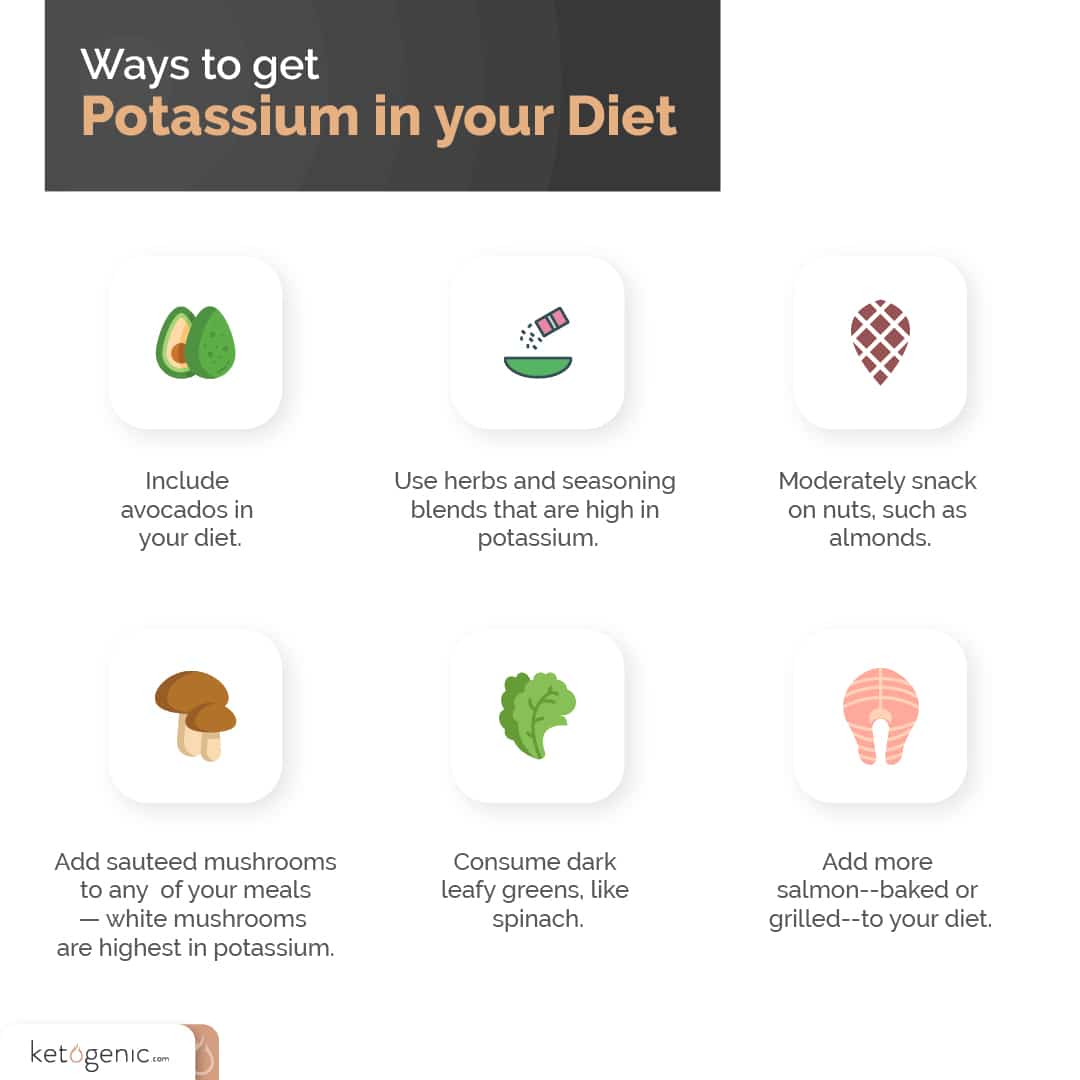
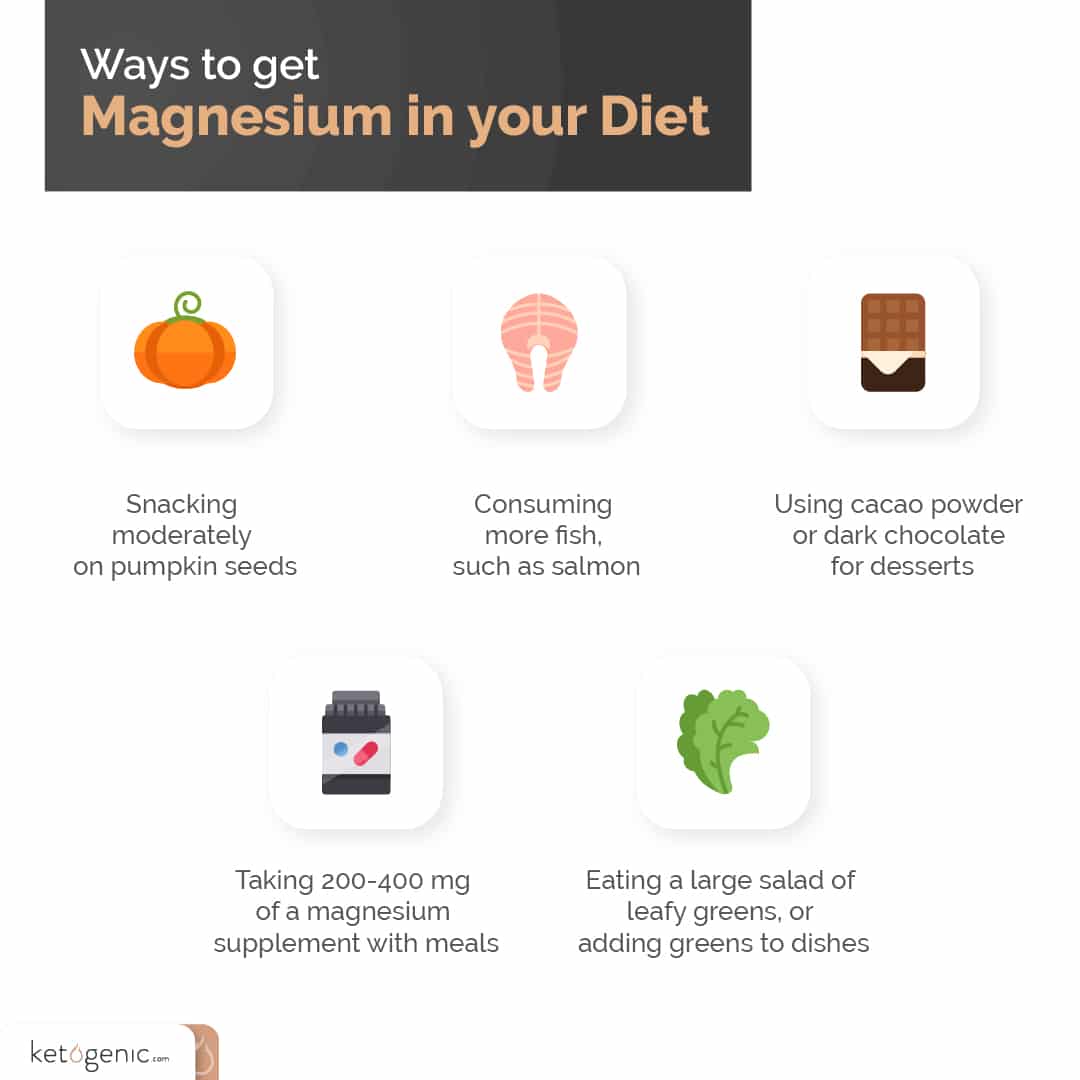
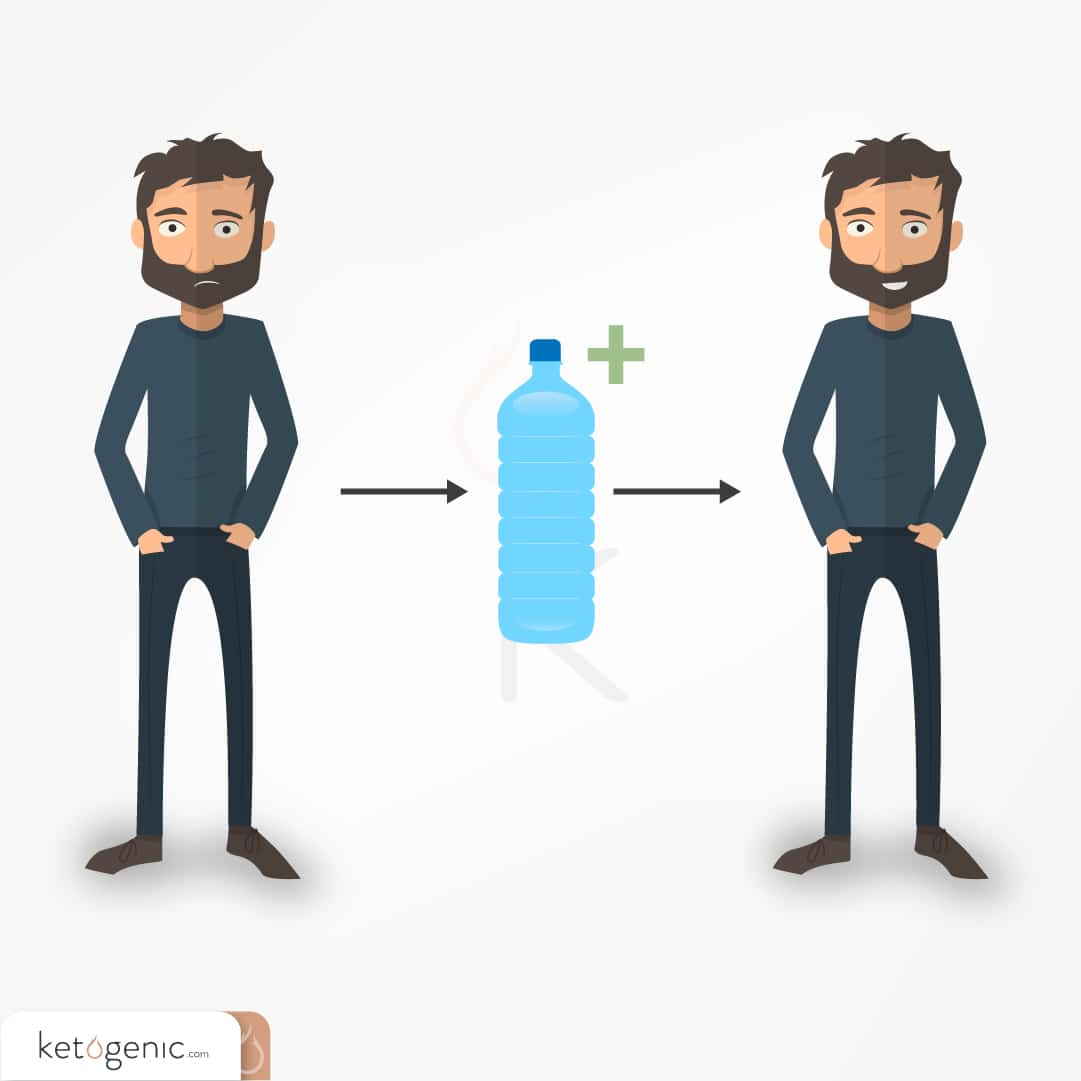








If I just add a one-a-day multivitamin can I just consider all bases covered?
That is a great start but for some individuals that will not be enough. Definitely a great start though!
Why not mention calcium? A deficiency can cause some of the keto flu symptoms.
Great point!
I’m taking 2 99mg potassium supplements a day plus drinking calm night magnesium drink morning and night,but I’m still getting bad symptoms?
are you also drinking enough water?
Does drinking sugar free tea count as drinking water?
In your third infographic, do you have “pancreas – excretes” and “kidneys – secrete” swopped around?
They are correct! The pancreas is responsible for producing and excreting insulin. When insulin lowers the kidneys will excrete more water.
After being on Keto for 2-3 months I started experiencing irregular heartbeat. I was eating well, and staying hydrated. Doing 3 spin classes/week plus weights 1-2x per week. After a week and a half of continuing Keto adding in more electrolytes, the condition continued to worsen. Bloodwork for deficiencies came back normal. After 2 weeks I added in carbs and continued supplementing sodium, magnesium, etc. After 3 weeks the issue seems to be getting better. Can Keto cause such drastic issues? It was not a Keto flu issue like one would have in the initial stage. I am afraid to try to get back into Ketosis now. Maybe I’ll stick with low carb but not Keto. Any thoughts welcome please…!
From Dr. Ryan:
There are several factors that can cause that. There is no research showing that a well-formulated ketogenic would do that. A lot of times it is an electrolyte imbalance (remember you need extra sodium, potassium, and magnesium) since you excrete a lot of those out when insulin is low. Let us know if there’s anything else we can do to help 🙂
How much is “extra” (potassium, sodium and magnesium). Can you give us quantity of food added or the amount of supplements to take.
Mine did the same thing . I added more carbs and potassium and I am better now.
Does drinking sugar free tea count as water??